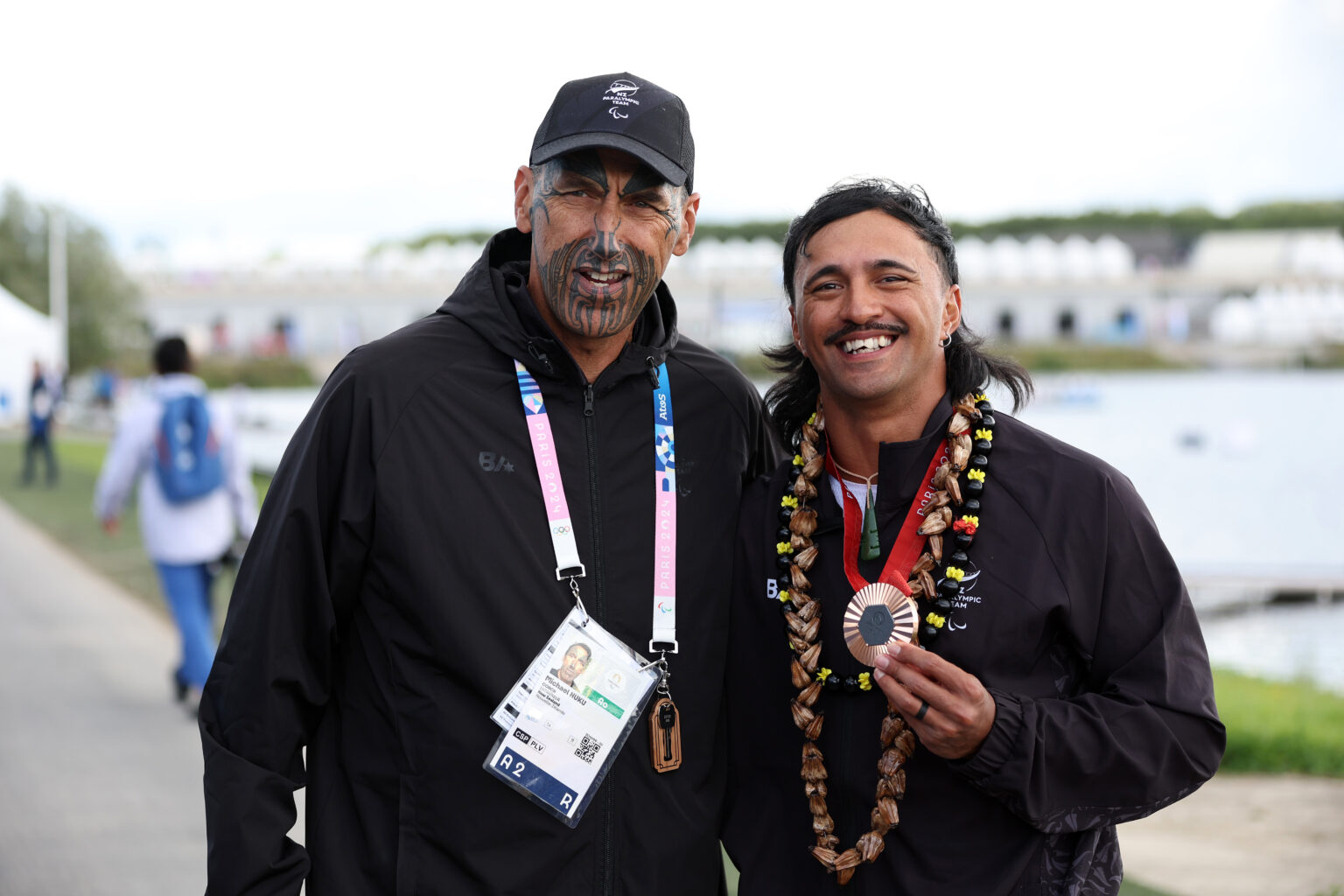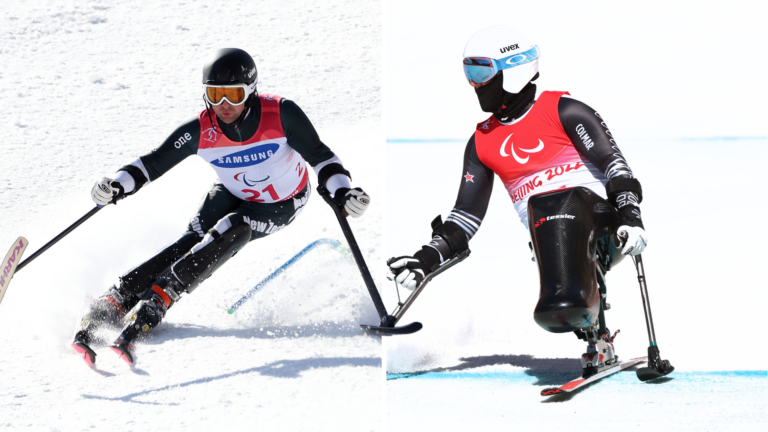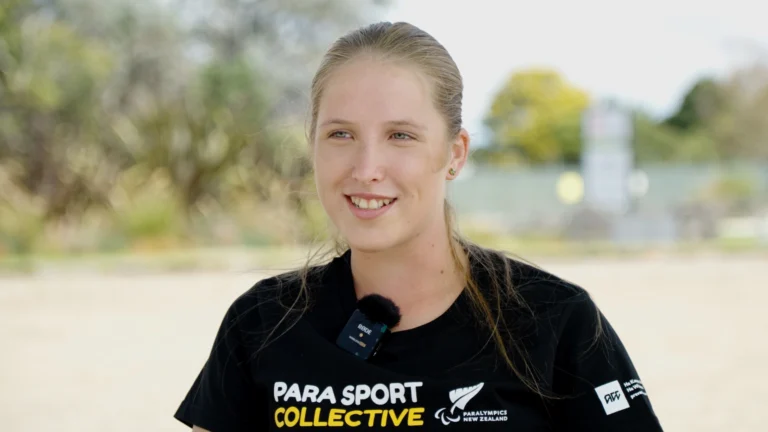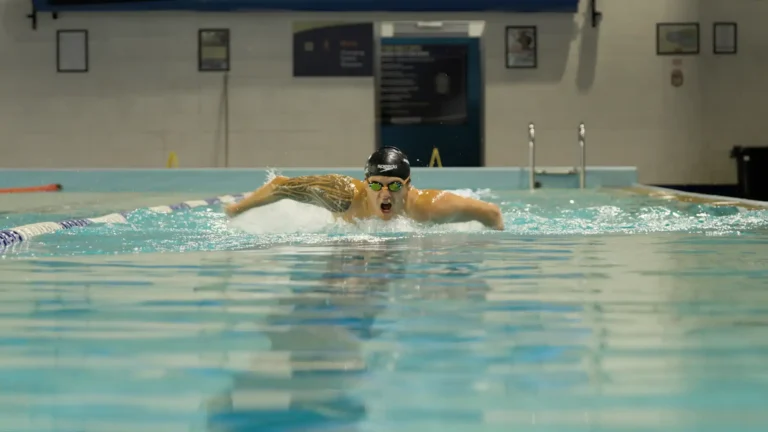Paris 2024 Paralympic Games Men’s 200m VL3 bronze medallist Peter Cowan provided a rip-roaring finale to the NZ Paralympic Team quest in the French capital. We chat to the 29-year-old Hawke’s Bay-based Para canoeist about his sizeable support team.
When addressing his success Paralympian #231 Peter Cowan likes to draw upon the proverb, ‘Ehara taku toa i te toa takitahi, engari he toa takitini’ or ‘Success is not the work of an individual it is the work of many’ and never is a phrase more illustrative of his journey to the Paris 2024 podium.
On the final day of the Games, the Hastings-based paddler executed the performance of his life to grab a stunning bronze medal in the Men’s 200m VL3. While Pete quite rightly accepted the accolades which went with his medal-winning accomplishment the father-of-two acknowledges that his success has only been possible thanks to a large and unwavering support crew consistently backing the 29-year-old.
Leading his army of supporters is wife, Olea. Married in 2018, Olea is the cornerstone of his success, supporting him in his quest to fulfil his sporting dreams.
“It takes a special person to support a big dream like this,” explains Pete of his wife, who works full-time as a bookkeeper. “To be honest, looking back when we committed to this journey years ago, we probably didn’t know what it would take to get here. The financial struggles to make it to pinnacle events, starting a young family, the strains on managing a young family and keeping the house afloat. To be able to help make dreams come true takes a special person to be by your side through the ups and downs. I don’t think people understand how challenging it was to get here, but now all of those sacrifices have paid off, it makes that journey even more special and beautiful. Olea has had my back the whole time.”
Raising two children, Kai, aged four and three-year-old Raniera, while juggling the demands of high performance sport, has not been easy. Prioritising the boys’ needs with his own is challenging. However, while accepting the ups and downs of family life, he says his kids act as a constant source of inspiration when on the water or in the gym.
“My eldest child was born at around the time my career kicked off, so it was a defining moment. I knew then that to get to this level (in sport) with a family was a big commitment. It has been special to share that journey with them, and to have someone doing what I’m doing in the family can hopefully also inspire them.”
Besides his wife and kids, Pete also owes a huge debt of gratitude to his mum, Geraldine. Describing her as “one of his biggest supporters” he says his mum has backed Pete to believe in himself.
“She has always been incredibly supportive and is my number one go to person if I need help with the kids,” she says. “It was fantastic she was able to come along to the Games this year. She has that ‘whatever it takes’ mentality which is probably something I didn’t realise that I also have until the past couple of years.”
Outside of the family Pete has also enjoyed enormous support in his sporting journey.
Pre-accident as a youngster his passion for sport was lit as part of the Puawaitanga Maori Sports Academy founded by Kevin Tamati, the Kiwis rugby league legend.
Describing Kevin as ‘instrumental’ in engendering his love of sport, Pete was inspired at the Academy by such a ‘role model’ and ‘local hero.’
“The reason why I had my accident was I that I was training to compete in IronMāori through the academy,” he explains of the background to his accident at the age of 15 when he was clipped off his bike by a car and the resulting injuries led to amputate his injured leg.
“But I don’t regret training for that event because the accident put me on this pathway to a successful career. Being part of the academy gave me the belief from an early age that if you put your mind to it, you can achieve.”
Pete also owes a huge debt of gratitude to Quentin Crawford and Jem Te Huia – a pair of teachers at his former school Hastings Boys’ High School – who have been a consistent support for many years.
“Quentin and Jem started me on my waka ama journey and adapting to life with a disability,” says Pete. “They were core drivers in encouraging me to take up what I love and they even both turned up at the airport when I arrived back from Paris, which is testament to the strong relationship we have.”
In more recent times a mainstay of Pete’s success has been his coach Myka Nuku. After reconnecting with waka ama in 2017 after several years away from the sport he was coached by Myka’s wife, Roni, and he insists both have played a key contribution to his ongoing success.
“Experiencing such a good environment with Roni helped me stick around the sport longer,” Pete explains. “The more I then got to learn under their guidance they made me realise the potential I had. It has been cool to learn and grow with them along the way.”
Describing Myka as a coach who insists it should always be fun in the pursuit of ambitious goals he adds: “He always has my best interests at heart. He is a good teacher, I learn quickly from him and he takes any feedback I give him very well. Myka is always open to learning more, I trust his ideas and he trusts me.”
There are others who have played their part in Pete’s journey. He has welcomed the support he has received in his partnership with HPSNZ staff in campaign planning. He makes mention of HPSNZ Performance Team Leader Paul Smith as well as Head of Performance and Technique Analysis Paul McAlpine and nutritionist Kim Abbott for the role they have played.
“Having the resources that they have provided has been instrumental in my journey,” he explains. “We have reached the highs thanks to the staff at HPSNZ. We feel the campaign is cared for, it has been cool navigating through that and coming up with our own blueprint.”
Closer to home for Pete he also appreciates his “small team” that work out of the Hawke’s Bay Community Fitness Centre in terms of Strength and Conditioning and Athlete Development support. Pete believes basing his campaign in the Hawke’s Bay – he trains on the Clive River – has had a positive impact.
“It has been good that the community have been able to share my knowledge and energy down here,” he says. “I feel at home when doing the mahi and I’m inspired by training with other teams down here like the Central District Stags and some other national teams use the facility.”
Also keen to acknowledge the local waka ama, kayaking and rowing communities for their presence on the water – for what is largely a solo campaign – has made the experience far less isolating and given Pete a greater sense of accountability.
“There are so many people who have made an impact on my journey, to acknowledge them is the least I can do,” he says. “I’m very happy to represent my sport on the world stage and to see that so many people are excited by waka ama, which has done so much for me since I was young and keeps giving now I’m older is very special. To be able to be part of that journey is very humbling, but it would not have been possible without the support of many others.”
Image: Getty Images


























